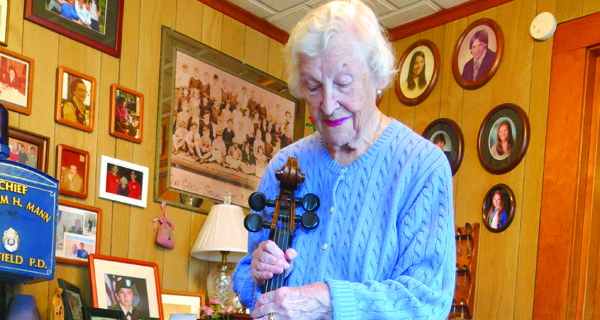As a former Medfield Police crossing guard for 50 years and the wife of Medfield’s former police chief, 86-year-old Elisabeth Berlin Mann’s desire to protect is in her blood – and today that includes her father’s childhood cello.
It all started with Elisabeth’s father, Paul Karl Berlin, who started studying music in Germany at a very young age and decided to make the cello his primary instrument when he was a teenager.
“My father was a banker, but before he went into business, he had attended the University of Berlin for music – he was training to be a musician,” said Elisabeth. “He loved the cello and played it in the orchestra…he also played the tuba – on horseback in the Kings Cavalry Marching Band!”
As a child, Elisabeth recalled growing up with her parents and ten siblings in a home filled with music - until World War II intervened.
“We had a music room that had every instrument in it imaginable…a piano, trumpets, an upright bass…a Russian Balalaika (a string instrument). My sisters and brothers all played at least one instrument. I played the flute, and my brothers played the piano. My mother also played the zither. Every Sunday afternoon we would all play music together – it was part of our lives,” Elisabeth recalled with fondness.
Elisabeth described her early childhood in Stuttgart, Germany – in a home situated on property next to land owned by royalty -- as idyllic. But she noted that when Adolf Hitler was appointed Chancellor in 1933, her family’s life changed as government decrees and mandates were imposed.
Despite Hitler’s regime, daily music continued in the Berlin family – at least until the start of WWII. British bombs were dropped on Stuttgart during the years between 1939 and 1945, and Elisabeth’s father was taken as a prisoner of war in the winter of 1945.
“Our home was burned to the ground the first time the bombs hit, and all of our instruments except for our piano, my mother’s zither, and my father’s cello were destroyed,” said Elisabeth. “We were only able to save the piano by chopping off its legs, otherwise we wouldn’t have been able to get it out the door in time. Our mailman helped us.”
Elisabeth added that the Steinway Company heard about the piano, sent someone to pick it up and repair it, and keep it safe in the Steinway shop in Stuttgart. (The company was founded in 1853 by New York resident/German immigrant Henry Engelhard Steinway.)
Family efforts also enabled the zither and cello to survive the war, but given its large size, the cello was the hardest to move around safely.
“As we ran between temporary housing and bomb shelters, my mother would always take my father’s cello with us. She wanted to do everything to protect it,” said Elisabeth.
The Berlin family cello bore witness to many good times in its early life but was forced to change family hands frequently during tumultuous times. One of these times was a post-war year when Elisabeth was captured by Russian soldiers while trying to cross back into non-communist territory. She was arrested and placed in Buchenwald concentration camp, located on the old German border.
“I was lucky to have escaped that camp – many others weren’t so fortunate. You just can’t believe what I saw there. So many people were sick and abused by the guards,” said Elisabeth, who noted that during the time she was in the concentration camp, the cello was safe with her mother in Stuttgart.
One of the happiest times in Elisabeth’s life was meeting her husband, Bill, in the early 1950s when he was a U.S. military policeman stationed in Germany.
Bill and Elisabeth got married in Germany, and then came to the U.S. to live and raise their three children (including one who participated in the Medfield High School music program). During this time, the cello stayed behind with her siblings in Germany.
After Elisabeth’s last surviving sibling passed away, the Berlin family cello was shipped to her for safekeeping in Medfield, where it remains today, more than 100 years after her father played it as an aspiring young musician.
Thankfully, there is no war to threaten the safety of the Berlin family cello, and now Elisabeth can simply enjoy the beauty of the instrument and the memories it holds.
“Every time I look at the cello, it reminds me of my father playing it at home. I can still hear his music.”










